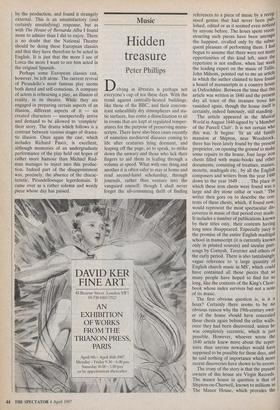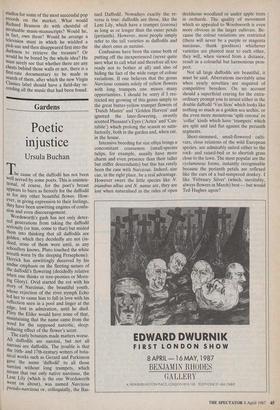Music
Hidden treasure
Peter Phillips
Delving in libraries is perhaps not everyone's cup of tea these days. With the trend against centrally-heated buildings, like those of the BBC, and their concom- itant unhealthily dry atmospheres and sta- tic surfaces, has come a disinclination to sit in rooms that are kept at regulated temper- atures for the purpose of preserving manu- scripts. There have also been cases recently of nameless mediaeval diseases coming to life after centuries lying dormant, and leaping off the page, so to speak, to strike down the unwary and those who lick their fingers to aid them in leafing through a volume at speed. What with one thing, and another it is often safer to stay at home and read second-hand scholarship, through journals, rather than venture into the vanguard oneself; though I shall never forget the all-consuming thrill of finding references to a piece of music by a recog- nised genius that had never been pub- lished, edited or as it seemed even noticed by anyone before. The hours spent recon- structing such pieces have been amongst the happiest, rivalled only by the subse- quent pleasure of performing them. I had begun to assume that there were not many opportunities of this kind left, since the repertoire is not endless, when last week the leading expert on the music of Tallis, John Milsom, pointed out to me an article in which the author claimed to have found a hoard of manuscripts in a country house in Oxfordshire. Between the time that this article was written in 1840 and the present day all trace of this treasure trove has vanished again, though the house itself is certainly, indeed famously, still standing. The article appeared in the Musical World in August 1840 signed by 'a Member of the Purcell Club'. It is not certain who this was. It begins: 'In an old family mansion at Shipton, near Woodstock, there has been lately found by the present proprietor, on opening the ground to make some repairs to the house, four large iron chests filled with music-books and other documents, consisting of treatises, masses, motetts, madrigals etc., by all the English composers and writers from the year 1480 down to the year 1649 . . . . The place in which these iron chests were found was a large and dry stone cellar or vault.' The writer then goes on to describe the con- tents of these chests, which, if found now, would represent the most spectacular dis- coveries in music of that period ever made. It includes a number of publications known by their titles only, their contents having long since disappeared. Especially juicy Is the promise of the entire English madrigal school in manuscript (it is currently known only in printed sources) and secular part- songs by Cornysh, Taverner and others of the early period. There is also tantalisingly vague reference to 'a large quantity of English church music in MS', which could have contained all those pieces that so many people have hoped to find for so long, like the contents of the King's Choir- book whose index survives but not a note of its music.
The first obvious question is, is it a hoax? Certainly there seems to be no obvious reason why the 19th-century own- er of the house should have concealed these chests again behind the cellar walls, once they had been discovered, unless he was completely eccentric, which is just possible. However, whoever wrote the 1840 article knew more about the reper- toire than anyone nowadays would have supposed to be possible for those days, and he said nothing of importance which more recent discoveries have shown to be errors.
The irony of the story is that the present owners of this house are Virgin Records. The manor house in question is that of Shipton-on-Cherwell, known to millions as The Manor House, which provides the studios for some of the most successful pop records on the market. What would Richard Branson do with chestsful of invaluable music-manuscripts? Would he, in fact, own them? Would he arrange a television stunt in which he wielded a pick-axe and then disappeared first into the darkness to retrieve the treasure? Or would he be bored by the whole idea? He must surely see that whether there are any chests behind those walls or not, there is a first-rate documentary to be made in search of them, after which the new Virgin Classics label should have a field-day re- cording, all the music that had been found.



























































 Previous page
Previous page